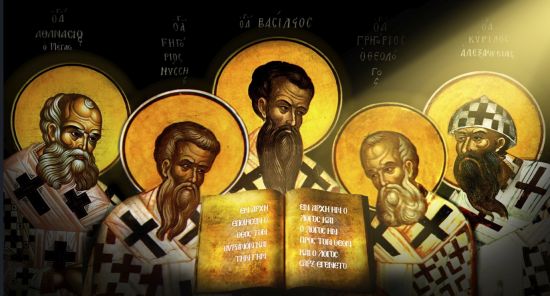- Home
- About us
- Students
- Courses
- Research
- Library
- News & Events
- Gallery
- Contact
- Our Blog
Latest News

2014 St Andrew's Patristic Symposium
→ Back to all Patristic Symposia
St Andrew's 6th Patristic Symposium
'From Alexandria to Cappadocia and Back Again'

On 26-27 September 2014, the Very Revd Dr Doru Costache (Senior Lecturer in Patristic Studies, St Andrew's) and Dr Adam G. Cooper (Senior Lecturer, John Paul II Institute for Marriage and Family), convened St Andrew's Sixth Patristic Symposium, 'From Alexandria to Cappadocia and Back Again'. Featuring keynote speakers Professor Paul M. Blowers (Emmanuel Christian Seminary, Tennessee, USA) and Dr Bronwen Neil, FAHA (Assistant Director of the Centre for Early Christian Studies, ACU, Brisbane), the symposium primarily explored the connections between the Alexandrian and the Cappadocian traditions in Late Antiquity, more precisely the ways in which the two centres influenced each other. The symposium also offered a range of insightful presentations on the Alexandrian and Cappadocian traditions and their representatives along with other relevant figures and themes.
Convened by:
The Very Rev Dr Doru Costache and Dr Adam G. Cooper
We welcome presentations from the different disciplines of Christian theology interested in further reflecting on this central doctrine of the Church, irrespective of their field of expertise, academic affiliations or denominational background. Indeed, it is hoped that this cross-disciplinary approach (whether this be systematic theology, patristics, ethics, biblical studies, church history, liturgics, etc) will contribute by casting further light - indeed a more enriching and holistic perspective - to this most significant Christian teaching.
Keynote Speakers
Keynote Address:
"Mystics and Mountains: Comparing Origen’s Exegesis of the Transfiguration and Gregory of Nyssa’s Exposition of the Sinai Theophany"
Abstract: Origen’s interpretation of the Transfiguration of Christ on Mt Tabor proved to be crucially important for his larger Christology and understanding of the economy of salvation, while Gregory of Nyssa’s interpretation of the Sinai Theophany in Exodus was a key link in his apophatic theology and his understanding of human participation in the mystery of the triune God. This lecture will compare the two as models of “anagogical” and “mystical” exegesis in which the biblical text is envisioned as providing its own spiritual topography and strategy of elevation, with the living Logos himself as guide to sublime intimacy with God.
Dr Brownwen Neil, FAHA
Keynote Address:
"Signs of Theosis in Synesius of Cyrene"
Abstract: The germ of the idea of deification through contemplation of the divine (theosis) is found in Plato, who wrote of a divine spark in each human being that longs to return to the stars, whence it came. This idea was considerably developed by neo-Platonists, both Christian and non-Christian, in the third and fourth centuries. Synesius of Cyrene was a neo-Platonist long before he was made bishop of Ptolemais in the early 400s. Trained in Alexandria by Hypatia, the famous woman philosopher, Synesius found deification, becoming like God (or ‘The God’), a useful concept in his tracts On Dreams and On Dio, both written before his ordination. I consider the origins and development of this concept in Synesius’ neo-Platonist forebears, Plotinus and Porphyry, and its usage in Synesius’ works. A comparison with the concept in the works of the Cappadocian Gregory of Nyssa will then be made.
→ Back to all Patristic Symposia

.jpg)





.png)